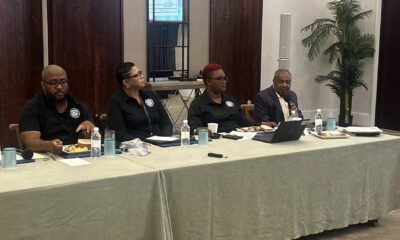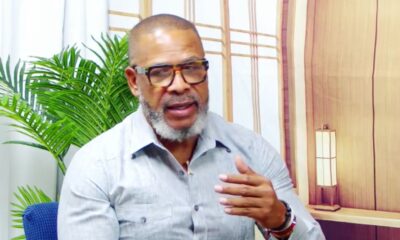#TurksandCaicos, February 3, 2021 – A desperate scramble to regain millions of users who migrated from WhatsApp over fears of privacy infringements may be futile for the company, which has billions of subscribers and it may have been just the jolt mobile phone users needed to shift to a better product; At least that is what the team at Digicel Turks and Caicos believes and over the weekend, Magnetic Media was introduced to the benefits of Bip.
“Bip
is the better alternative; Bip is secure and Bip also has ten-way video calling
which WhatsApp doesn’t have, and it has an auto translate feature which allows
you to be able to speak to someone in another language,” said Addison Stoddard,
CEO of DigicelTCI.
Stoddard
said Bip is clean, adding the company has no need of your private information
as a user; he called the WhatsApp postponement of the January roll-out of what many
have described as a more invasive privacy policy to March an attempt to “claw
back” after the market got skittish about WhatsApp.
WhatsApp
is owned by Facebook, which also owns Instagram.
Media
reports say this of the WhatsApp policy change:
“WhatsApp’s
new privacy policy reveals that personal data of users, including phone number,
IP address, contacts, status, groups (including group name, group picture,
group description), payments or business features, profile photo and timestamp,
will be shared with third-party websites such as Facebook.”
For many islanders the
prospect of privacy invasion is frightening.
A roving social media message had warned about the new policy and it whipped-up
Magnetic Media’s interest in the Digicel-endorsed Bip application.
Among
the interesting features touted on the free app, which earns the rating of 4.6
stars is that it offers HD quality audio and video; allows one to do the same
things and enjoy the same sort of icons which we are accustomed to on WhatsApp
but there are more options including games and synching information to the app
including weather .
Bip
allows creation of groups and translates my English text to other languages
including French, Spanish, Turkish, Italian, Mandarin, Arabic, German and
Russian.
Recognizing
the superiority of Bip in terms of what it allows a user to do and what it
offers to the diverse marketplace, Digicel on October 20, 2020, during its
worldwide announcement of being the Caribbean’s first ‘Digital Operator’
announced Bip as one of its all-included apps.
“We
have allotted data with all of our applications so when you activate a prime
bundle you get like 30GB with Bip.”
Drexler
Smith is the new marketing man for Digicel in Turks and Caicos; he believes Bip
users love the secret messaging feature which allows messages to disappear
automatically.
“I
think the best feature is the secret messaging; you can actually set messages to
disappear after three, five and ten seconds.”
Bip
has been downloaded 65 million times, and with the blunder by WhatsApp over
changes in its privacy policy, Bip has attracted 8 million new users worldwide;
including me.
Digicel
executives are not surprised by the surge in users of Bip. Relaying to Magnetic Media in an over-the-Bip
three way interview that, “It far surpasses any other communication app when it
comes to mobile devices.”
And
one does not have to be a Digicel customer to get Bip; however, Digicel
customers who are also prime bundle subscribers get the app as one of a eight
in a suite which gives huge capacity including movies and music; without
putting a run on mobile data.
“You
don’t use up your normal data for Bip,” said Stoddard, “because Bip has its own
data allocation. If you have a 30-day
play that has 6GB of data to be used for everything else, your emails,
Facebook, Instagram, YouTube and whatever else that you do. So, we give you 30GB of data to be used on
Bip. We give you 30GB of data to be used
on PlayGo, which means you can watch TV on PlayGo. You also have 30GB of data, extra, to use on SportsMax
so each of our apps have an additional data allocation specific for that
particular app and that has nothing to do with your regular data.
In
fact, internet reports say developer of Bip, Turkcell, which is a Turkish
telecommunications company was already winning the race as the most downloaded
messaging app in the Middle East and Eastern Asia. Now, the developer of Bip is reaping soaring
global popularity; interest is up enormously worldwide.
Reviews
of the app are largely positive; recommending the app for quality video calls,
group video chats and privacy.
Criticisms are largely linked to challenges if a phone number is changed
and the user wants to re-install Bip; there are lags in messages to reboot Bip.
“There
are a lot of touch points on Bip.
Simply, it is a new way to communicate and a secure easy way to have free
of charge communication, it can translate in 106 languages, you can utilize
games and let’s not forget about the secret messaging feature.”
Turks
and Caicos (and some Caribbean) users, in my person Bip contacts folder number
64 individuals and the cool sound the app makes when a message comes in is for
me, an adorable feature too.
While
using Bip will absorb the mobile data for non-Digicel subscribers, it is good
for consumers to have this full run-down of Bip, which can be downloaded from both
the App Store or Google Play for free.


 News4 days ago
News4 days ago
 News1 week ago
News1 week ago
 Caribbean News5 days ago
Caribbean News5 days ago
 News4 days ago
News4 days ago























